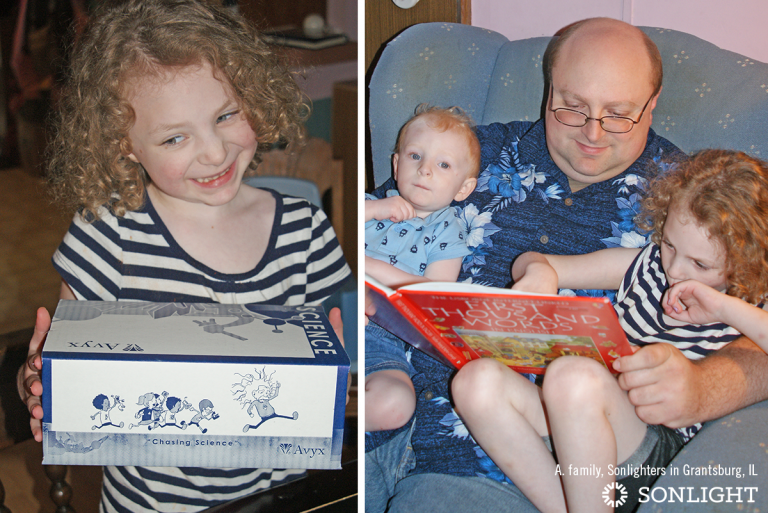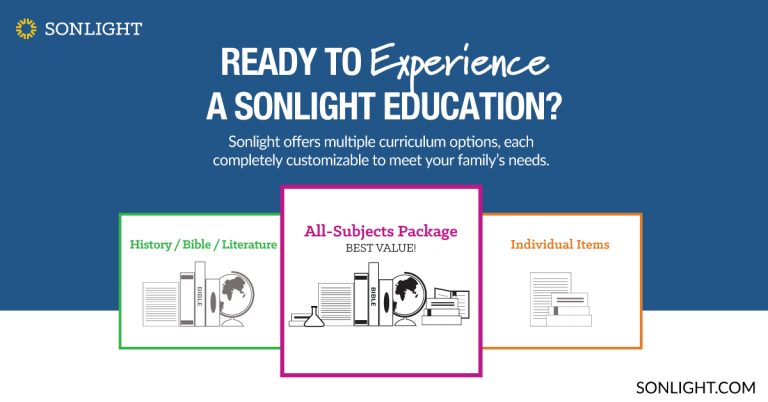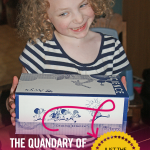
We are a second generation homeschooling family. My husband was homeschooled using Sonlight, and my mother-in-law introduced it to me when we started homeschooling. I love the Instructor's Guides and how easy it is to use. My daughter Anastasia (age 4) loves books because of Sonlight. She also loves science and can't wait until she can start Science A.
—A. family, Sonlighters in Grantsburg, IL
I see you, second-generation homeschool moms. We were the guinea pigs—those of us homeschooled in the 80s and 90s when homeschooling was much less widely accepted than it is today.
In that era, our parents didn’t take us out in public on school days for fear of running into strangers who still questioned the legitimacy, and even the legality, of homeschooling.
Most of us who continue the legacy by homeschooling our own children admire our parents a great deal. They were counter-cultural and had far fewer resources. Back then, helping your child do research meant paging through an actual encyclopedia rather than hopping on the internet and reserving books through the library’s website.
As second-generation homeschoolers, we now find ourselves wanting to continue in the paths our parents blazed, but we wonder sometimes if we’re disloyal by wanting to change our homeschool culture. Maybe we want to add new emphases that didn’t exist in the homeschools we were raised in.
First-Generation Homeschool Mistakes
My parents both attended an engineering university—my dad in the mechanical engineering track and my mom in the electrical engineering track. It may not surprise you that as a high schooler, I took advanced physics and advanced chemistry courses, along with as many math courses as I could fit into my schedule, ending with calculus my senior year. As a homeschooled student, I was well-prepared academically to go into a science and technology field.
But it turns out, I was a Mandarin Chinese major and spent the four years of my college studies taking Spanish and Japanese courses on the side, along with every writing elective that I could get myself into.
My parents did an excellent job of educating me, but they missed the fact that my talent and passion lay in language and writing. They recognized that I was academically gifted, and prepared me very well for the science and math-based career that, from their angle, seemed the right fit for their gifted student. Because languages are not one of their passions, it didn’t occur to them that my brain angled that direction.
I’m not disappointed in the way I was homeschooled. I thrived as a homeschooled student, and I thrived in college when I decided to take my education in a totally different direction. I now spend my days neck-deep in a multilingual education community where I create with words. I’m fully content with the direction my education and passions have taken me in life.
The Second-Generation Homeschooler: Torn Between Choices
As a second-generation homeschooler, I have found myself sometimes torn between loyalty to doing things “the way mom did” and taking my own homeschool in a different direction.
- Do I use the same curriculum that I was taught with because it’s familiar and I know it works?
- Or do I try different curricula that didn’t exist when I was in school?
- Do I skew my own homeschool toward language study because that’s my area of passion?
- Or do I go the opposite direction and skew my children toward science and math?
The Second-Generation Homeschooler: Learning from Mom
I’ve decided neither to copy the first generation nor to depart from it entirely, but rather, to learn from the choices my own parents made as homeschoolers. This is the great gift that we have in the second-generation!
We’re not all on our own, figuring out what homeschool might look like. We’ve seen homeschool before; we know what it can look like. And we have ideas for taking our own second-generation homeschools further.
When you design your own homeschool as a second-generation homeschool parent, reflect on your past with questions like these:
- What classes from my own education have benefited me the most in life post-graduation?
- What classes from my own education do I have little-to-no recollection of?
- What type of homeschool experiences and assignments do I remember with joy?
- What homeschool experiences were difficult or unpleasant, but, in retrospect, were needed for my character growth? Which unpleasant experiences probably could have been avoided?
The Best of Both Worlds—Old and New
We second-generation homeschoolers have both a gift and a responsibility! We need to be thoughtful as we plan our children’s education, not doing things exactly the way we remember merely because “that’s how mom did it,” but also not entirely doing away with the tried and true homeschool methods that worked for ourselves as children and teens.
My school will probably have a little less emphasis on math than my parents’ did. However, I’ve learned from my own experience of homeschool that I want to be flexible, always on the lookout for cues about where my children’s passions and interests lie. I’ve learned that I shouldn’t assume that because I’m not interested in something, that my child won’t be interested in it either. If I find out that I’m raising a little person who’s far more comfortable with numbers than with conversing in Mandarin, well, bring on all the algebra! I’m ready. After all, those advanced math courses I took when I was homeschooled are sure to come in handy someday.
Whether you are a first-generation homeschooler or a second-generation one, Sonlight has a program for your children. See your options here.









My children (21, 16 & 13) speak very positively about the likelihood of home educating their own children one day. I'm going to be soooo interested to see how they go about it! In our small but growing home ed community here in the UK they have seen their friends educated in such a wide range of styles, so they will have a bank of ideas to draw on in due course.